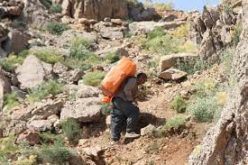RFL/RE – A world-class Iranian archer is seeking asylum in Europe, the second athlete from Iran in recent weeks to refuse to return to his country.

Puriya Jallalipur stayed in the Netherlands after competing in the World Archery Para Championship that took place in the city of Den Bosch from June 3 to June 9.
Officials confirmed Jallalipur was still in Europe as of September 4, while Iranian judo champion Saeid Mollaei said he was afraid to return home after disobeying an official’s demand that he not win some of his bouts at the judo world championships in Tokyo held on August 25 to September 1 in order to avoid a potential match up with an Israeli athlete.
The head of Iran’s Archery Federation, Shaabani Bahar, said on September 4 that Jallalipur has refused to return to Iran.
“Despite our efforts, Jallalipur is not willing to return to Iran,” Bahar was quoted as saying by the semiofficial ISNA news agency.
The head of Iran’s Archery Association for the Disabled, Majid Kehtari, had said in June that Jallalipur had left his hotel to have lunch with his brother and then did not return.
Kehtari later said Jallalipur had decided to spend time with his brother in Belgium but said he would eventually return to Iran.
“His mother is in Iran and she told us that he would definitely return,” he was quoted as saying.

Jallalipur has not publicly commented on his decision to leave his team behind and remain in Europe. RFE/RL was unable to reach him.
Meanwhile, judoka Mollaei told RFE/RL’s Radio Farda on September 4 that he was not seeking asylum in Germany but that he’s decided to change his life.
“I don’t want to face these problems anymore,” Mollaei said, referring to Iran’s ban on athletes from competing against Israeli athletes. Iran does not recognize the state of Israel and the countries have been archenemies for decades.
There have been several instances in recent years in various sports when an Iranian athlete has forfeited instead of facing a competitor from Israel.
Mollaei, the defending world judo champion in the 81-kilogram division, said he was told on four occasions to not compete because he could later face an Israeli athlete, Sagi Muki, who eventually won the gold medal.
If the allegation that he intentionally lost matches is true, it could result in Iran’s judo federation being sanctioned.
Mollaei suggested he would compete at the 2020 Tokyo Olympics, but not for Iran.
“I could have [won the tournament],” he said in a video posted online on September 1 by the International Judo Federation (IJF).
“I had been training hard,” he added.
“But the National Olympic Committee of Iran and the sports minister told me to not compete, that I had to comply with the law,” Mollaei said. “I am a fighter. I want to compete wherever I can. I live in a country whose law does not permit me to do that. We have no choice; all athletes must comply with it.”
He said: “Even if the authorities of my country told me that I can go back without any problems, I am afraid. I am afraid of what might happen to my family and to myself.”
The president of Iran’s Olympic Committee, Salehi Amiri, was quoted by domestic media as saying that Mollaei would be welcomed home “like a champion” even though he didn’t do as he was instructed to do.
Mollaei won four of his matches and lost two at the Tokyo world championships.
“We have assured Mollaei that he and his family will not and have not faced any threats or danger,” Amiri told Iranian state media. “We guarantee that if he returns to Iran we will welcome him like a champion with open arms,” he said.
Meanwhile, IJF President Marius Vizer has promised that the organization will give Mollaei its full support.
“First of all, we will do everything to support the athlete so he can continue his career and participate in the Olympic Games,” Vizer told AFP on September 1.
“We will do our best so that he can compete in the Olympic Games. Later we will see for which team — there are different options, but one of them will be applied for [him to compete at] the Olympics.”
In recent years, about a dozen Iranian athletes have reportedly refused to return home after taking part in international competitions.
In 2018, a member of the Iranian Wheelchair Basketball national team, Saman Balaghi, sought asylum In Germany at the end of the world championships in Hamburg.
 Shabtabnews In this dark night, I have lost my way – Arise from a corner, oh you the star of guidance.
Shabtabnews In this dark night, I have lost my way – Arise from a corner, oh you the star of guidance.


